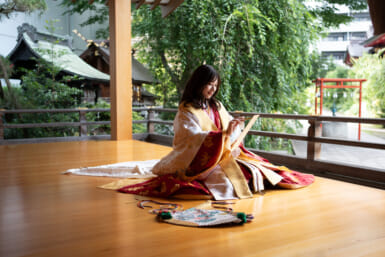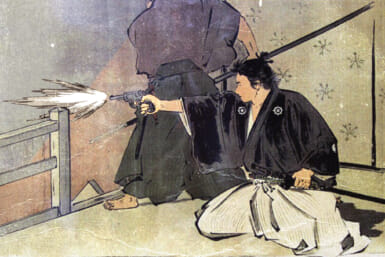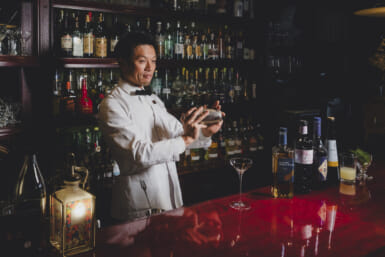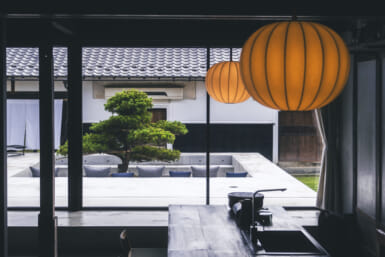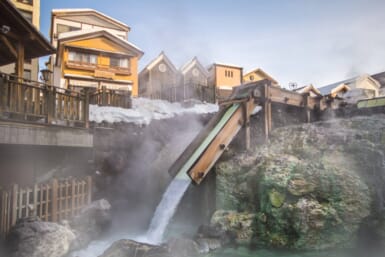by Miranda Kenrick
A multi-lingual friend of mine telephones a Tokyo hotel where a visitor from Greece, a man with the surname of Lemos, is staying. He asks for Mr. Lemos’ room number.
“Is that ‘L’ as in Rome?” asks the Japanese voice at the other end of the telephone.
“No,” replies my quick-witted friend, “It’s ‘R’ as in London.”
And, believe it or through to Mr. Lemos.
My mother, whose name is Vivienne, gives her name over the telephone to a man who is to send her a pamphlet. She wonders at the ease with which he accepts her name and thinks he must be a movie buff, familiar with Vivien Leigh.
Well, the pamphlet arrives all right, envelope addressed to “BBN Kenlik.”
Pronunciation and spelling can produce sniggers in such cases as the note a Japanese wife writes her American husband, “Please get me up early because I have to go for erection.”
Equally, they can be quite innocuous, as in a letter written by a Japanese man traveling abroad for the first time.
“Shopsman didn’t understand me when I ask for cho ko raite. I must say the word many times before they know what I want.”
He is a horse breeder and writes at some length about “stuck bleeders” (stock breeders!).
Students produce their share of howlers. In a dictation lesson, the teacher dwells on crime prevention. Back comes an essay about “grime prevention.”
Another teacher dictates to his class, “After the Meiji Restoration, Japan worked very hard to adopt Western methods of culture and technology.”
One of his students carefully writes down, “After the Meiji Frustration, Japan worked very hard to adopt Western methods of torture and technology.”
Signs around Japan are of never-ending interest. “Please walk on the paved carpet,” for one. “Let’s have a great protection for the old fragile cultural assets,” for another.
A park has this injunction, “Please do not enter. This is a park for some old ladies.”
Written instructions elsewhere range from “fire escaper” and “do not throw” to this sign in the Gyokusendo Caves in Okinawa: “No smoking, no photographing. Stalactites and stalagmites grow one millimeter every 3 years. Please do not touch and hands off them. Here is the middle pleace. Have a nice cave tour.”
A ship has its rules and regulations which include, “For safety of life cargo and ship, it is prohibited to bring swords, guns, rifles, and other inflammables and explosives into cabin without permission if you have such things with you. Please apply to information. Crew will keep them as long as you are among passengers.”
Idly I wonder how many foreign residents or visitors even own swords, never mind carry them.
At the end of the 1975 ocean Exposition in Okinawa, a hotel offers a “sayo-nara plan.” It circularises a notice that says, “On the 18th January 1976 the Ocean Exposition in Okinawa do-coming to the final goal. Which is suceeded in fluentry with happiness. For your great efforts during the terms, we should have the chance to contact in some kind of the planning. Up to this moment we want to you advise and greeding with under planning. Before you leaving Okinawa, please stand-by and enjoy yourself.”
You can fill your own home with all sorts of interesting items. A washer in a department store is labelled, “free size twinkle tap.” Air fresheners, on near-by shelves, come in four varieties. “Be free from care as a butterfly,” is one. “Don’t be flurried as a little fish,” is another. Then there are “Keep a clean life as a racoon,” and “Wake up early as a bird.”
There’s a bronzing oil that “makes you wild and sexy.” As for “rice cockers” and tooth picks called “dent pecker,” well, really…
A tooth brush has on its packet, “Oh yes! Find out nice feeling!” A hair spray’s slogan is “hair up blow.” A hair gel comes in three varieties: “Miss Party,” “More setten,” and “wet pose.”
A skipping rope is called “My jump” while pastel-colored hangers, clothes lines and scrubbing brushes are called “My green life.”
A self-massaging instrument has a couple of pages of blurb which begin: “Many people feel stiffness or ache on their back or neck. They cannot, however, rub or beat freely by themselves. With this you can make massage or finger pressure cure lightly on your back in particular, the parts around your shoulder blade or waist. After bathing it’s further effective as muscles being loosened.”
Food and drink, tee shirts and shopping bags are usual sources of Japlish. You might find yourself offered “rose wine squash,” “sour crout,” or “coffee and curried.” Then there’s a “plan rice,” and called “pal sweet.”
A tin of noodles advertises itself as a “brand new light meal. The rule of Archimendes. Crispy tiny noodle x quality sauce=walking men i.e. Archimendes.”
A chocolate says it “gives you the warm feeling of love. Very graceful, sweet and more lovely chocolate make yourself with Cecil.”
A “bourbon pressive chocolate” says “beautiful things are beyond time. Woman’s history “cease to yearn for beauty,” while another chocolate has “delicate taste of brandy soaked apple in the heart.”
A “bourbon pure cut” is a “pure and fresh candy for the pure” while another bourbon candy comes in two flavors. The mint one says “let’s enjoy sports and this refreshing fragrance of mint,” while the lemon one toys, “let’s enjoy refreshing sports and this intense sourness.”
Speaking of sourness, I am intrigued by a canned drink that says on the can, “Pokka white sour is refreshing and white like Alpine snow. Its sour taste of yogurt will extend on your tongue softly and be a sweetheart.”
Another soft drink declares, “there is a gallon of deliciousness in every drop. Reach for the taste of good taste. Your ticket to drink paradise.”
Kirin beer, it seems to me gets somewhat carried away in 3 propaganda . “The legendary Kirin is a symbol of good luck. Open up Kirin today and you’ll see what it’s all about,” is mild compared to “Fly with Kirin on a voyage of discovery. Up through the clouds and into the heavens. Past the moon and the sun. the planets and the stars, into a land of taste experiences you’ll never forget.”
Sapporo, by comparison, says only “the superior filtration method and total microorganisms control gave birth to Sapporo draft beer.”
Some messages on tee shins and shopping bags are hopelessly garbled, while others are most interesting. I am distinctly embarrassed to report that there is at least one Japanese teenage girl wandering around with “want to pat my pussy” written across her chest — but there she was.
A bikini-clad girl on the beach has “the torrid zone” enscribed across her bottom. Another girl, this one in shorts, has “bully club, have a good time” written across hers.
Two aprons sit side by side on a department store shelf. One says on it, “hop on the back of a big roving whale and you will go to places boy such far away dreams.” The other invites you to “take a swing on the man on the moon till you are up and away lost among the stars.”
Women’s underwear, manufactured under license from Fruit of the Loom, has a second. Japanese, tag on it, that adds, in English, “Fruity Joy. Refined Sense.”
Here are a few shopping bag slogans. “Handling elegance.” “Pineapple Samba Wao! Cause Music is tight and feel so high just be free.” “Being alone. 1,000 miles far away. So please write to put the silver lining behind my cloud.” “You are too important to have ugly pockets. Slim down and feel younger with the bag.” “As the sun sparkled again, tears subsided. Time has come for another to shine.” “Passion. It visits on a lifetime. As if a shower is passing.” “Survival chic. As old wood is best to burn, old horse to ride, old books to read, and old wine to drink, so are old friends always most trusty to use.”
A bumper sticker carries this mysterious message: “drug store is the name of the loved ladies.”
A notebook says on it. “memories of what once was, the sentimental fool, a tear, his only comfort his bag of ebi-sen.” Another says, “Potato girl. This potato is a lovely girl,” while a smilar one proclaims, “Radish baby. This radish is a merry baby.” A notebook with baseball terms ail over its cover, includes the phrase “antsy pants.”
From notebooks to letters. I have in my possession a yellowing letter written from New Zealand in July, 1951. It is from a Japanese man on his first overseas trip, looking at the possibilities of importing New Zealand horses into Japan.
“This is my first attempt writing letter in English,” he begins. “I am just going to write it taking my courage as like horse riding and jump.”
Later in the letter he comments. “One day when we were in kinema and we saw your Emperor picture on the screen. Large audience stoop up at their seat. I felt it very comfortable.”
Another horsey letter, this one written in 1956, is from Japan’s equestrian entrant to the Olympic Games. He says, “Horse is in quite good condition and the voyage seems to suffer him nothing. Although sometimes he jumps a little bigger than I expect but I should like to be as man and wife until Olympic Game, not in hurry.”
Years later this same man writes of another partnership with another horse. “I’m still struggling with my mare under the burning sun with hopeless hope”
Still later he comments on paper, “the organization has no rule now. Regulations in programs were scrulched and one man rules and all others were never against him. He is one of those mountaintoper.”
When our own dear old horse died at the age of 36, he had been the oldest horse in Japan. He had also had a celebrated career, having represented Japan in two Olympic Games. He had a magnificent funeral service, attended by equestrian personalities. The gentleman who read the eulogy had also composed a song which he sang in Japanese. He then read his version in English, “In memorium of Fuji. His distinguished deed shall be compared to the elegant figure of Ml Fuji. Now he sleeps comfortably in the flower bed permanently.”
We had never been to anything like it.
But back to letters. One from another overseas traveler, horrified at his schedule, says, “Oh, my every muscle is wanting something like spinach though I’m not Popi.”
We visit Giftu and are startled by the guide’s explanation of the art of cormorant fishing. ‘The birds cannot swallow the fish,” he says, “because their long necks are tied on by string.”
Back in Tokyo, we send an article about Gifu to an English student, that is, a student of English. His thank you letter begins. “Many thanks for the nice novel writting the cormorant fishing. I surprised your wonderful talent. I read your letter and story to my palent. They has hearing at it admiringly.”
Wc visit a Japanese man in Hokkaido who pours out all his woes. He later writes a letter and adds this p.s. “The biggest problem since I came to Sapporo has been solved by firing a woman and a man, for which I am very sorry. This is confidencial, please.”
Another letter begins, “It was very kind of you to send me a copy of your story of me which I had been waiting for because my son soiled the one I had already got from the newspaper delivered to my home while he was translating it into Japanese for his grandmother.”
Several friends have contributed their favorite examples of Japlish.
A flash light, attached to a wall in a hotel corridor, has this plaque under it: “Flush light. Just pull down and let’s go.” A laundry truck’s slogan is, “in hot pursuit of dainty.” A bar offers a “bottle yourself keeping system.”
A block of condominiums are advertised as “condoms,” A friend swears that above the flush in a toilet, somewhere in the hinterland of Japan, is a sign, “please use your foot to handle the cock.”
After that, an “antic museum” stems awfully tame! As does a hotel’s “celebration of half millionth guest,” and a railway station’s “waiting room for parties.”
A notice, thrust into our letter box, is in Japanese with a scrawled message in English: “tomorrow, from midnight to 12 noon, you will receive dirty water.”
“Expect the unexpected” is a good motto by which to live in Japan.
In Hokkaido we are taken to a tomb dedicated to pulled teeth. A dentist has buried 54,000 of the 60,000 teeth he has extracted in 20 years of practice. Over all those thousands of teeth he has lovingly arranged for a monument to be built, a monument in the shape of a tooth.
On another trip, we arrive early in the morning somewhere in the Japanese countryside. We have been on a slow train overnight and we are hungry. So we hail a taxi and ask him to take us to a restaurant. Yes, he knows a restaurant and we’re off. We drive a couple of blocks, then crunch over gravel and pull up outside a fine looking building. Its shutters are down, however, and its door is locked.
Surprised at our surprise, the driver says, “It doesn’t open until 11 o’clock.”
We are at a luncheon in one of Tokyo’s posh hotels. It is a set lunch, but we ask the young waiter if we could possibly have rye bread instead of white. He looks terribly worried and disappears. Nothing happens and by the time dessert arrives, we’ve forgotten about the bread.
Well, as the coffee cups are being cleared and we settle back to listen to the speeches, the waiter reappears. He places a prettily wrapped box on the table, then retreats. The box contains half a loaf of rye bread. I still think he went out and bought it.
My friend Judy, similarly at a set dinner, asks the waiter if she could take home her lamb chop bones for her dog. He, too, looks somewhat disconcerted.
As Judy leaves the table after dinner, she meets the waiter hovering at the door. He presents her with two enormous shopping bags, filled with lamb chop bones. He has whipped around the kitchen, collecting every bone from every plate.
Judy’s dog is happy for a month.
Ten years ago, I worked at the Ocean Expo in Okinawa. The Expo site had a post office and I had a post office box. It happened to be on the very lowest level, so I always squatted down to see if there were anything in it.
Well, one morning I bent over instead of squatting. And as I straightened up, I looked over the counter. All the post office workers were on their feet, all bowing back at me.

